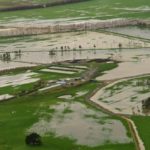News - Construction News
New approach to reduce flood risk and clean up rivers

A consistent approach to sustainable drainage systems is set to be incorporated into new developments in England.
The recommendation to make sustainable drainage systems mandatory to new developments in England is the result of the Government’s review. This will reduce the risk of surface water flooding, pollution and help alleviate the pressures on our traditional drainage and sewerage systems.
New developments can inadvertently add to surface and sewer flood risk by covering permeable surfaces like grassland and soil that would otherwise assist in dealing with heavy rainfall.
The new approach to drainage will ensure sustainable drainage systems are designed to reduce the impact of rainfall on new developments by using features such as soakaways, grassed areas, permeable surfaces and wetlands. This reduces the overall amount of water that ends up in the sewers and storm overflow discharges. Certain features such as tanks and water butts also allow for water reuse and reduce pressures on water resources.
Following publication of the review, regulations and processes for the creation of sustainable drainage systems at new developments will now be devised, through the implementation of Schedule 3 to the Flood and Water Management Act 2010. Implementation of the new approach is expected during 2024.
Environment Minister Rebecca Pow said: “Our traditional drainage systems are under increasing pressure from the effects of climate change, urbanisation and a growing population.
“The benefits of sustainable drainage systems are many – from mitigating flood risk by catching and storing surplus water and reducing storm overflow discharges, to enhancing local nature in the heart of our developments and helping with harvesting valuable rain water.
“Taking a more consistent and effective approach to sustainable drainage systems will improve the resilience of our drainage and sewer infrastructure, while reaping these broader benefits.”
Schedule 3 provides a framework for the approval and adoption of drainage systems, a sustainable drainage system approving body within unitary and county councils, and national standards on the design, construction, operation, and maintenance of sustainable drainage systems for the lifetime of the development. It also makes the right to connect surface water runoff to public sewers conditional upon the drainage system being approved before any construction work can start.
Government will now give consideration to how Schedule 3 will be implemented, subject to final decisions on scope, threshold and process, while also being mindful of the cumulative impact of new regulatory burdens on the development sector.
If you would like to read more stories like this, then please click here
Related Articles
More News
- Merit Appointed to NHS Shared Business Services Modular Building Framework
1 Jul 25
Merit is pleased to announce its successful appointment to the NHS Shared Business Services (NHS SBS)
- £1Bn backed renewal of broken bridges, ruined roads and tired tunnels
30 Jun 25
The Structures Fund will inject cash into repairing bridges, flyovers and tunnels across Britain.
- £8Bn to be invested in flood defences over the next decade
27 Jun 25
A record £7.9Bn over ten years has been committed to flood defences.






